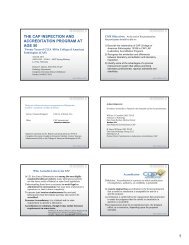ABO Discrepancies Disclosure Objectives Importance Recognition ...
ABO Discrepancies Disclosure Objectives Importance Recognition ...
ABO Discrepancies Disclosure Objectives Importance Recognition ...
Create successful ePaper yourself
Turn your PDF publications into a flip-book with our unique Google optimized e-Paper software.
4/12/2011<br />
Forward Grouping Problems<br />
Mixed field (mf) agglutination<br />
Weak or missing antigens<br />
Additional or unexpected antigens<br />
Polyagglutinable cells<br />
Forward Grouping Problems<br />
Mixed Field (mf) Reactions<br />
Small agglutinates with many un-agglutinated cells<br />
Result of:<br />
Mixed cell population from a massive transfusion of another blood<br />
group. (non-O individual receiving O red blood cells)<br />
Bone marrow transplants having both the original type and donor<br />
marrow cells.<br />
The inheritance of weak <strong>ABO</strong> subgroups such as A 3 , A x and B 3 and<br />
B can traditionally present a mixed field reaction.<br />
Chimerism due to the intrauterine exchange of red cells, fraternal<br />
twins, and mosaicism arising from dispermy presents mixed field even<br />
though it rarely occurs.<br />
Forward Grouping Problems<br />
Resolving Mixed Field (mf) Reactions<br />
Determine the CAUSE of the mixed field reaction<br />
Checking the patient’s transfusion history and clinical history<br />
e.g. HPC transplant<br />
If it is determined that it is a weak subgroup, perform<br />
specialized tests<br />
e.g. adsorption and elution, saliva, and transferase studies<br />
Molecular testing<br />
Forward Grouping Problems<br />
Weak or Missing Antigen<br />
Result of:<br />
Inheritance of a weak <strong>ABO</strong> subgroup<br />
Malignancies may result in the loss of ABH transferases<br />
Hodgkins disease<br />
Lymphomas<br />
Leukemias<br />
Massive transfusion with group O blood to a non-group O<br />
person<br />
e.g. a group A person receiving lots of group O blood.<br />
Bone marrow transplant and chemotherapy.<br />
Forward Grouping Problems<br />
Resolving Weak or Missing Antigens<br />
Check the patient’s transfusion and clinical history<br />
Read the forward group microscopically<br />
Use anti-A,B and monoclonal antisera that is known to react with<br />
A x and dA 3 weak <strong>ABO</strong> subgroups<br />
Perform adsorption and elution studies<br />
Forward Grouping Problems<br />
Additional Antigens<br />
Result of:<br />
Bacterial enzymes deacetylate the A antigen to a “B”<br />
antigen and the patient front types as an AB and reverses<br />
as an A.<br />
Acquired B antigens are observed in patients with<br />
recurring GI or colon infections with Gram negative<br />
bacteria<br />
4




